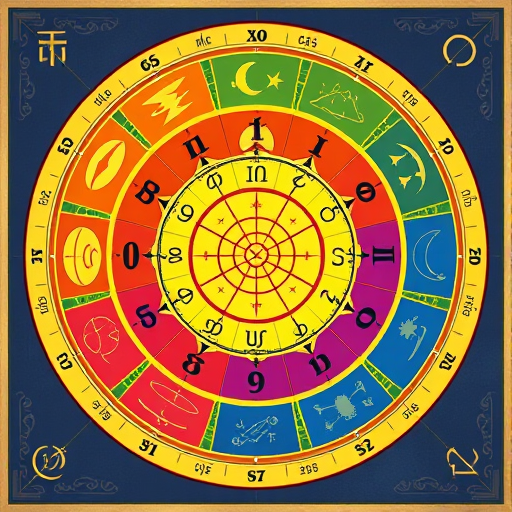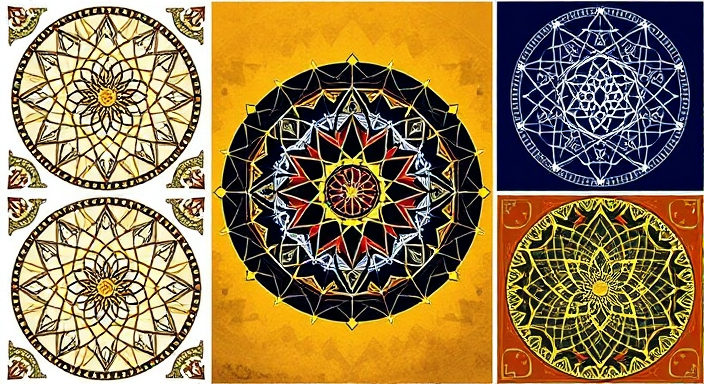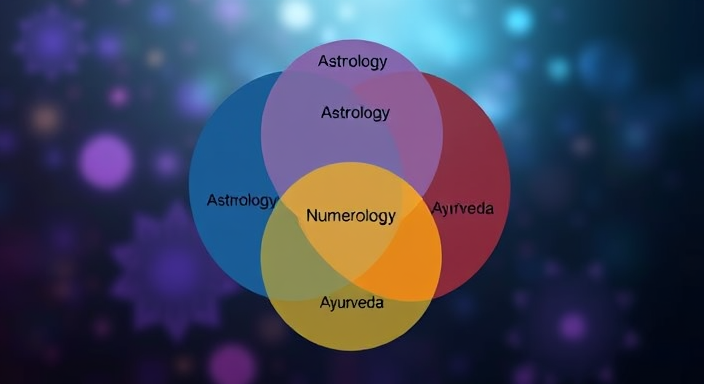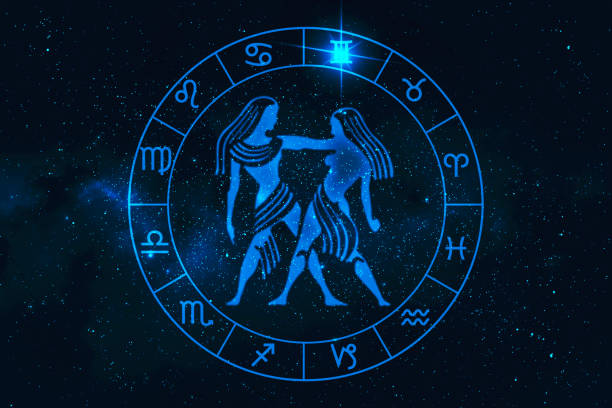For millennia, humanity has gazed at the stars, pondered the significance of numbers, and sought remedies from the natural world to understand our place in the universe and achieve optimal health. Astrology, numerology, and Ayurveda, each a distinct system of knowledge, offer profound insights into our individual natures and the interconnectedness of all things.

While often studied independently, these disciplines reveal a remarkable synergy when viewed through a holistic lens. This blog post delves into the intricate relationship between astrology, numerology, and Ayurveda, exploring how their combined wisdom can unlock a deeper understanding of our physical, mental, and spiritual well-being.
Table of Contents
I. Astrology: The Celestial Map of Our Lives
Astrology, derived from the Greek words “astron” (star) and “logia” (study), is the ancient practice of interpreting the positions and movements of celestial bodies to understand their influence on human affairs and earthly events. It posits that the planets, stars, and other celestial bodies exert a subtle yet pervasive influence on our personalities, life paths, and even our health.
1.1 Core Concepts in Astrology:
- The Birth Chart (Natal Chart): The foundation of astrological analysis is the birth chart, a snapshot of the celestial sphere at the precise moment of an individual’s birth. It depicts the positions of the Sun, Moon, planets, and other significant points, providing a unique astrological fingerprint.
- Zodiac Signs: The ecliptic, or apparent path of the Sun across the sky, is divided into twelve equal segments, each corresponding to a zodiac sign. These signs, each associated with a specific element, mode, and ruling planet, provide insights into our core personality traits, strengths, and weaknesses.

- Planets: The planets in astrology represent different archetypal energies and aspects of our psyche. The Sun embodies our ego and vitality, the Moon reflects our emotions and instincts, Mercury governs communication and intellect, Venus represents love and beauty, Mars signifies action and drive, Jupiter symbolizes expansion and abundance, Saturn embodies structure and discipline, Uranus signifies innovation and change, Neptune represents illusion and spirituality, and Pluto signifies transformation and power.
- Houses: The birth chart is further divided into twelve houses, each representing a specific area of life, such as career, relationships, finances, and health. The placement of planets within these houses reveals how these energies manifest in different aspects of our lives.
- Aspects: Aspects are angular relationships between planets, indicating harmonious or challenging interactions between their energies. Conjunctions (0 degrees), oppositions (180 degrees), squares (90 degrees), trines (120 degrees), and sextiles (60 degrees) are the major aspects.
1.2 The Zodiac Signs and Their Elemental Associations:
The twelve zodiac signs are grouped into four elements: Fire, Earth, Air, and Water. These elements represent fundamental energies and temperaments.
- Fire Signs (Aries, Leo, Sagittarius): Energetic, passionate, enthusiastic, driven by intuition and inspiration. Tendencies toward inflammation, burnout, and impulsiveness.
- Earth Signs (Taurus, Virgo, Capricorn): Grounded, practical, reliable, focused on stability and security. Tendencies toward stagnation, rigidity, and stubbornness.
- Air Signs (Gemini, Libra, Aquarius): Intellectual, communicative, adaptable, driven by ideas and innovation. Tendencies toward anxiety, restlessness, and scattered energy.
- Water Signs (Cancer, Scorpio, Pisces): Emotional, intuitive, sensitive, driven by empathy and compassion. Tendencies toward stagnation, emotional overwhelm, and escapism.
II. Numerology: The Language of Numbers
Numerology is the ancient practice of assigning numerical values to letters and using these values to gain insights into personality, destiny, and life events. It posits that numbers possess inherent vibrational qualities that resonate with our lives and influence our experiences.

2.1 Core Concepts in Numerology:
- Life Path Number: The most important number in numerology, calculated by summing the digits of your birth date and reducing them to a single digit (except for master numbers 11, 22, and 33). The life path number reveals your core purpose, strengths, and challenges.
- Expression Number (Destiny Number): Calculated by summing the numerical values of the letters in your full birth name. The expression number reveals your inherent talents and abilities, and how you express yourself in the world.
- Heart’s Desire Number (Soul Urge Number): Calculated by summing the numerical values of the vowels in your full birth name. The heart’s desire number reveals your deepest desires, motivations, and emotional needs.
- Personality Number: Calculated by summing the numerical values of the consonants in your full birth name. The personality number reveals how you present yourself to the world and how others perceive you.
- Birth Day Number: The day of the month on which you were born (reduced to a single digit, except for master numbers). The birth day number reveals specific talents and opportunities that are available to you throughout your life.
2.2 The Meaning of Numbers in Numerology:
Each number in numerology has a specific meaning and vibrational quality:
- 1: Independence, leadership, initiative, ambition, self-reliance.
- 2: Harmony, cooperation, diplomacy, sensitivity, balance.
- 3: Creativity, communication, expression, optimism, enthusiasm.
- 4: Structure, stability, practicality, discipline, hard work.
- 5: Freedom, adventure, change, adaptability, versatility.
- 6: Harmony, responsibility, nurturing, compassion, service.
- 7: Introspection, intuition, spirituality, wisdom, analysis.
- 8: Abundance, power, success, ambition, authority.
- 9: Compassion, humanitarianism, empathy, idealism, completion.
- 11: Intuition, inspiration, idealism, enlightenment.
- 22: Mastery, leadership, building, vision.
- 33: Compassion, healing, teaching, service.
III. Ayurveda: The Science of Life

Ayurveda, meaning “the science of life” in Sanskrit, is an ancient Indian system of medicine that emphasizes the interconnectedness of body, mind, and spirit. It views health as a state of balance and harmony within these three realms, and seeks to restore balance through diet, lifestyle, herbal remedies, and other natural therapies.
3.1 Core Concepts in Ayurveda:
- The Five Elements: Ayurveda posits that the universe is composed of five basic elements: Ether (Space), Air, Fire, Water, and Earth. These elements combine to form the three doshas.
- The Three Doshas: The three doshas, Vata, Pitta, and Kapha, are bio-energetic forces that govern the physiological and psychological processes within the body. Each dosha is a combination of two elements:
- Vata (Ether + Air): Governs movement, circulation, respiration, and the nervous system. Qualities include dry, light, cold, rough, and mobile.
- Pitta (Fire + Water): Governs metabolism, digestion, transformation, and body temperature. Qualities include hot, sharp, light, liquid, and oily.
- Kapha (Earth + Water): Governs structure, stability, lubrication, and immunity. Qualities include heavy, slow, cool, oily, and smooth.
- Prakriti (Constitution): Each individual has a unique combination of doshas that determines their constitution, or Prakriti. Understanding your Prakriti is essential for maintaining balance and preventing disease.
- Vikriti (Imbalance): When the doshas become imbalanced due to diet, lifestyle, stress, or other factors, it leads to Vikriti, or imbalance. Ayurveda seeks to restore balance through personalized therapies that address the specific doshic imbalances.
3.2 The Doshas and Their Qualities:
- Vata: Characterized by dryness, lightness, coldness, roughness, and mobility. Vata governs movement, communication, and the nervous system. Imbalances can manifest as anxiety, insomnia, constipation, and joint pain.
- Pitta: Characterized by heat, sharpness, lightness, liquidity, and oiliness. Pitta governs metabolism, digestion, transformation, and body temperature. Imbalances can manifest as inflammation, skin rashes, heartburn, and anger.
- Kapha: Characterized by heaviness, slowness, coolness, oiliness, and smoothness. Kapha governs structure, lubrication, immunity, and stability. Imbalances can manifest as weight gain, congestion, lethargy, and depression.
IV. Connecting the Dots: Integrating Astrology, Numerology, and Ayurveda
The true power of these ancient systems lies in their ability to inform and complement one another. By understanding the interconnectedness of astrology, numerology, and Ayurveda, we can gain a more complete and nuanced understanding of our individual natures and tailor our health practices accordingly.
4.1 Linking Zodiac Signs to Doshas:
One of the most fundamental connections between astrology and Ayurveda is the association of zodiac signs with the three doshas:
- Vata Signs (Gemini, Libra, Aquarius): Individuals with strong Vata influences in their charts tend to be light, airy, and adaptable, but also prone to anxiety, restlessness, and digestive issues.
- Pitta Signs (Aries, Leo, Sagittarius): Individuals with strong Pitta influences in their charts tend to be fiery, passionate, and driven, but also prone to inflammation, irritability, and burnout.
- Kapha Signs (Taurus, Cancer, Capricorn, Pisces): Individuals with strong Kapha influences in their charts tend to be grounded, stable, and nurturing, but also prone to weight gain, congestion, and lethargy.
4.2 Linking Planets to Doshas and Ayurvedic Qualities:
Planetary influences can also be linked to the doshas and their corresponding qualities:
- Sun: Represents vitality, fire, and Pitta.
- Moon: Represents emotions, water, and Kapha.
- Mercury: Represents communication, air, and Vata.
- Venus: Represents beauty, harmony, and Kapha (specifically, the watery aspect of Kapha).
- Mars: Represents action, fire, and Pitta.
- Jupiter: Represents expansion, air, and Vata (specifically, the expansive aspect of Vata).
- Saturn: Represents structure, earth, and Kapha (specifically, the grounding aspect of Kapha).
- Rahu & Ketu (North and South Nodes of the Moon): Shadowy planets that correlate to Vata Dosha and mental afflictions/karmic debts.
4.3 Linking Numerology to Doshas:
Certain numbers in numerology can also be associated with the doshas:
- 1 (Sun): Represents leadership, individuality, and fire, aligning with Pitta.
- 2 (Moon): Represents harmony, emotion, and water, aligning with Kapha.
- 3 (Jupiter): Represents creativity, communication, and air, aligning with Vata (specifically, the expansive aspect).
- 4 (Earth): Structure, stability, aligning with Kapha.
- 5 (Mercury): Freedom, Adaptability, aligning with Vata.
- 6 (Venus): Compassion, aligns with Kapha.
- 7 (Neptune): Introspection, aligns with Vata.
- 8 (Saturn): Authority, aligning with Kapha.
- 9 (Mars): Humanitarianism, aligning with Pitta.
- 11, 22, 33: Master numbers with qualities of balancing the doshas.
4.4 Practical Applications: Tailoring Ayurvedic Practices Based on Astrological and Numerological Insights
The true value of this integrated approach lies in its practical application. By understanding your astrological and numerological influences, you can tailor your Ayurvedic practices to address your specific needs and tendencies.
- Example 1: A Gemini with a Life Path Number of 5
- Astrological Insights: Gemini, an air sign ruled by Mercury, tends to be intellectual, communicative, and adaptable, but also prone to anxiety, restlessness, and scattered energy.
- Numerological Insights: A Life Path Number of 5 reinforces these qualities, adding a desire for freedom, adventure, and change.
- Ayurvedic Recommendations:
- Diet: Favor warm, grounding foods like cooked grains, root vegetables, and soups. Avoid cold, dry, and processed foods.
- Lifestyle: Practice regular grounding exercises like walking in nature, gardening, or yoga. Establish a consistent daily routine to reduce anxiety and promote stability.
- Herbal Remedies: Consider taking adaptogenic herbs like Ashwagandha or Brahmi to calm the nervous system and promote mental clarity.
- Example 2: A Leo with a Life Path Number of 1
- Astrological Insights: Leo, a fire sign ruled by the Sun, tends to be passionate, confident, and creative, but also prone to pride, stubbornness, and burnout.
- Numerological Insights: A Life Path Number of 1 reinforces these qualities, adding a desire for leadership, achievement, and recognition.
- Ayurvedic Recommendations:
- Diet: Favor cooling foods like cucumbers, melons, leafy greens, and coconut water. Avoid spicy, oily, and fried foods.
- Lifestyle: Engage in cooling activities like swimming, spending time in nature, or practicing calming breathwork. Practice humility and gratitude to balance the ego.
- Herbal Remedies: Consider taking cooling herbs like Aloe Vera or Shatavari to reduce inflammation and promote balance.
- Example 3: A Pisces with a Life Path Number of 2
- Astrological Insights: Pisces, a water sign ruled by Neptune, tends to be emotional, intuitive, and compassionate, but also prone to escapism, emotional overwhelm, and stagnation.
- Numerological Insights: A Life Path Number of 2 reinforces these qualities, adding a desire for harmony, cooperation, and emotional connection.
- Ayurvedic Recommendations:
- Diet: Favor light, warming foods like cooked grains, vegetables, and spices. Avoid heavy, oily, and processed foods.
- Lifestyle: Practice regular exercise to stimulate circulation and energy flow. Engage in creative activities to express emotions and release stagnation.
- Herbal Remedies: Consider taking stimulating herbs like ginger or turmeric to improve digestion and boost immunity.
4.5 Using Astrological Transits to Anticipate and Address Potential Imbalances:
Astrological transits, or the current positions of the planets relative to your birth chart, can provide valuable insights into potential health challenges. For example:
- Saturn Transits: Transits of Saturn can bring periods of restriction, limitation, and responsibility, often affecting the areas of life ruled by the house in which Saturn is transiting. During these times, it’s essential to prioritize self-care and practice grounding Ayurvedic techniques to support the nervous system and maintain emotional balance.
- Mars Transits: Transits of Mars can bring periods of increased energy, motivation, and passion, but also a tendency towards impulsiveness and conflict. During these times, it’s important to channel your energy in a constructive way and practice cooling Ayurvedic techniques to prevent inflammation and burnout.
- Rahu & Ketu Transits: Transits of the lunar nodes can sometimes bring unusual diseases and ailments to the body, especially related to Vata imbalances. Ayurvedic practices such as Panchakarma, grounding herbs and practices like gentle exercise can be beneficial.
V. Conclusion: Embracing a Holistic Approach to Well-being
Astrology, numerology, and Ayurveda, while distinct disciplines, offer complementary perspectives on our individual natures and the interconnectedness of all things. By integrating these systems of knowledge, we can gain a deeper understanding of our physical, mental, and spiritual well-being and tailor our health practices accordingly. Embracing this holistic approach empowers us to unlock our full potential and live healthier, more balanced, and fulfilling lives.

As we navigate the complexities of modern life, the ancient wisdom of astrology, numerology, and Ayurveda provides a timeless guide for self-discovery, healing, and transformation. By learning to decode our cosmic blueprint, we can unlock the secrets to lasting well-being and live in harmony with ourselves, our community, and the universe.

